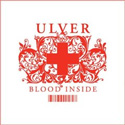
Ulver
Blood Inside
The End
Pitched at the magic hour between Depeche Mode at their leather-skirtiest and Yes/ELO at their cape-wearing ice-capades soundtracking best, Ulver’s masterful Blood Inside is completely, utterly, over the top. Epic end-of-the-century, synthesizer-driven post-new-wave poise (BowieLow) meets red-eyed proggy insanity and excess. Add a dash of the clove-scented psychedelic church songs of gothic misfits like the Tear Garden, and you’ve got a compact history of outsider music. Fearless.
Blood Inside is one of those records that leaves me open-mouthed in utter joy at the unexpected sounds and beauty and surprises to be heard within. Tracking the musical/aesthetic progression of Ulver is like looking at a chart of the evolution of chimp to man walking upright. It’s that drastic and shocking. Endlessly multitracked and treated vocals show faint glimmers of David Gahan and a subdued Freddy Mercury, but sound more like masses of angels taking a crack at the Beach Boys “In My Room.” That pretty. The songs seem to flow into one another, in an elegant, undulating whole. You’ll hear less obvious traces of Massive Attack, Radiohead, Black Sabbath (without the guitars), Sergeant Peppers Lonely Hearts Club Band, and a whole lot of the spirit of demented scorers/composers Spike Jones and Carl Stalling.
“Dressed In Black” is made of so many disparate movements that it feels like compacted classical music, opera, or King Crimson, as these things go. Starts out sounding like glacial trip-hop, carries through to a massive string section and percussion freakout, seemingly ends on a mad composer piano fill, but an epilogue choral waves and amniotic pulses only serve to lead us in to “For The Love of God.” And it’s like the lost soundtrack to an Aleister Crowley ceremony or the orgy in Eyes Wide Shut, effortlessly combining the sacred and profane, over a stately, martial beat, lush, symphonic orchestration, the sense of destiny, the slow burn, melancholy and menace.
“Christmas” boasts a cinematic sense of space and sonic structure along the lines of Massive Attack, but then brings in wind instruments, absurdly danceable pagan beats, and a soaring falsetto courtesy of vocalist/instigator Kristoffer Rygg, only to have it all drift away in a haze of druggy guitar noodling. “Blinded By Blood” is an impenetrable wall of pure shimmering sadness, starting off with an ancient gospel sample, and sumptuous strings until the voice of Rygg soars slowly into view like a seraphim – it’s like end-of-the-century blues or devotional music, stripped of all hurt and pain, simply floating high above the earth, where all you see is the deep blue of the sky. “It Is Not Sound” starts off slowly and deliberately, before exploding into pagan industrial dance, and as the feral drums fade, there is an interlude of complete ELP analogue keyboard heroics that Rick Wakeman would give his cape collection for, that fades into Phantom-esque organ melancholy.
“The Truth” crescendos to a soaring, theatrical soprano chorus of “There’s nothing inside” repeated over and over again until chopped-up sampled voices, a brutarian, slashing string section and utilitarian percussion take over and end it all. Glockenspiel and nervous strings immediately begin “In The Red,” with heavily-processed whispers and singing sounding utterly foreboding, before reaching a fateful pause and THEN upshifting into dramatic big-band orchestra, bombastic bop jazz all cut-up and collaged, runs and fills worthy of Carl Stalling. Amazing! It’s like hands on the radio dial! The tension in the string undercurrent that begins “Your Call” is palpable, similar to the “Beware” portion of the Ed Wood soundtrack, but immediately blooms outward into a sort of musical narrative audio verite that bolsters the lyrics (phone ringing when “pick up the phone” is sang), similar to “A Day In The Life” or This Mortal Coil’s original pieces or Guns N Roses’ “Coma.”. Frightening, as the sterile ring of the telephone keeps going long after the song has ended. The answering machine picks up. The final song, denouement, “Operator” is a harsher piece of dense, driving power, like Laibach in terms of authority and disengagement. It’s beyond trip hop and industrial, way beyond their extreme metal roots.
Listen to me though, this album is one that kids thirty years from now will unearth and hail as a forward-looking, revolutionary, adventurous forgotten classic. Let’s beat the pretentious little bastards to it.
The End Records: http://www.theendrecords.com












